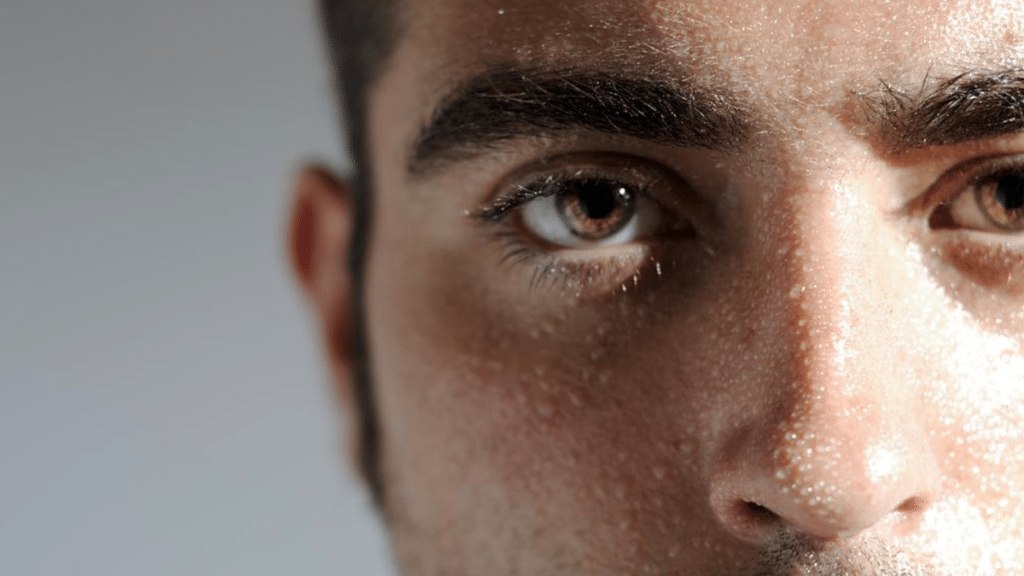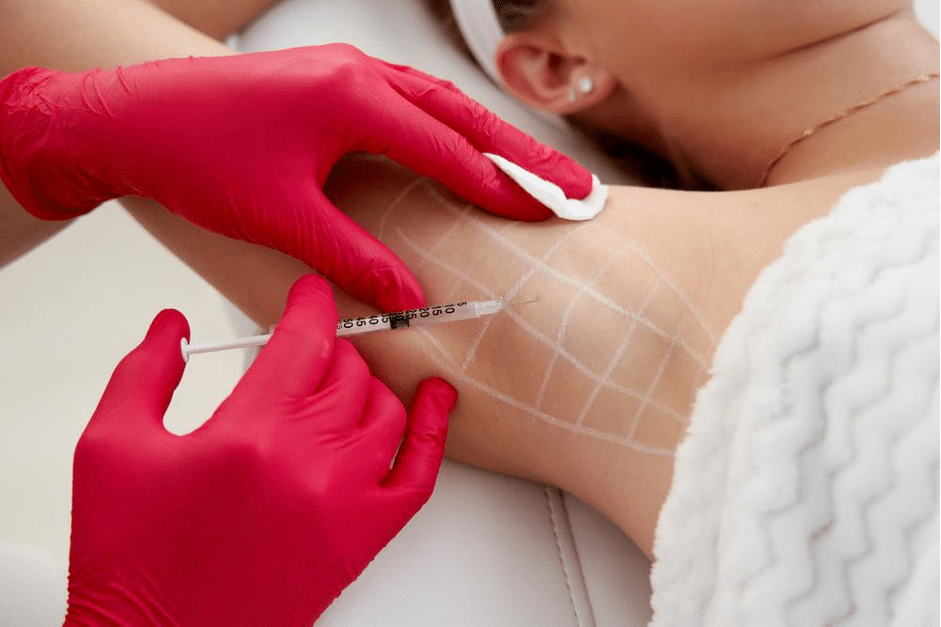
Sweating is a natural bodily function that helps regulate your body temperature and keep you cool. However, for some individuals, sweating can become excessive and disruptive, causing social embarrassment, discomfort, and interference with daily activities and quality of life.
In this article, we explore the causes and solutions of excessive sweating. Read on to learn about the different types of hyperhidrosis, the underlying factors that can contribute to increased perspiration, and the various treatment options you have for managing this condition effectively.
5 main causes of excessive sweating

Excessive sweating, also known as hyperhidrosis, is categorized into two main types: primary (or focal) and secondary hyperhidrosis.
- Primary hyperhidrosis is an increased perspiration in specific areas like palms, feet, or underarms and doesn’t usually have any medical cause. It often begins in childhood or adolescence and can be triggered by emotional factors or heat;
- Secondary hyperhidrosis can occur at any age and is caused by a medical condition or medication.
Let’s explore the top five common causes of excessive sweat.
#1 Medical conditions and infections
Excessive sweating can be one of the symptoms of medical conditions like hyperthyroidism, diabetes, and Parkinson’s disease.
- People with hyperthyroidism have an overproduction of thyroid hormones that can boost metabolism and body temperature, leading to intense and unpredictable perspiration;
- Individuals with diabetes (type 1 or type 2) can experience sweating episodes, particularly when they have low blood sugar (hypoglycemia), which is the body’s attempt to cool down and regulate blood sugar levels;
- A neurodegenerative disorder—Parkinson’s disease—can disrupt people’s autonomic nervous system (ANS), resulting in irregular sweating patterns, which can lead to both excessive sweating (hyperhidrosis) and reduced sweating (hypohidrosis).
Furthermore, infections like tuberculosis or endocarditis can increase body temperatures, prompting your body to sweat as much as possible, trying to cool down.
#2 Heat, humidity, and even cold
Environmental factors can influence the extent of your perspiration. In hot and humid weather conditions, your body produces more sweat to cool down, preventing overheating and heat-related illnesses. While sweating when cold is a phenomenon known as “cold-induced sweating”. Your body attempts to maintain a consistent core temperature for optimal function, generating perspiration even in chilly conditions to regulate your internal heat—a thermoregulatory response.
#3 Stress and anxiety
There’s a direct connection between emotions and sweating. Stress and anxiety, caused by various life challenges and work pressures, including a fear of burnout, can trigger the body’s “fight or flight” response, boosting perspiration. You can notice this response when experiencing excessive sweating on your hands—palmar hyperhidrosis. As our hands have a higher concentration of eccrine sweat glands, they can produce more moisture during emotionally charged moments.
#4 Medications and reactions to products
Certain medications have sweating as a side effect. These can be antidepressants, opioids, and some over-the-counter cold and allergy medications. Also, you can have acute reactions to skincare products, cosmetics, or detergents. Chemicals or allergens in these products can disrupt the skin’s natural barrier, triggering an inflammatory response that includes increased blood flow and moisture excretion in the affected area.
#5 Hormonal changes
Hormonal changes in the body causing excessive perspiration can arise from various factors:
- Puberty drives significant hormonal shifts during adolescence as sex hormones like testosterone and estrogen increase, leading to physical and emotional transformations;
- Menopause, typically occurring in a woman’s late 40s or early 50s, involves a decline in estrogen and progesterone production, resulting in hot flashes that cause night sweats;
- Pregnancy is followed by substantial hormonal fluctuations necessary for fetal development;
- Hormonal birth control methods alter hormone levels to prevent pregnancy, but can lead to hormonal side effects, including changes in sweat production;
- Medications like corticosteroids, which can lead to hormonal changes, may also result in hyperhidrosis as a side effect;
- Chronic stress, diet choices, weight changes, aging, and certain lifestyles can influence hormonal balance.
FAQ: Is it healthy to sweat a lot?
Sweating is generally a healthy response to regulate body temperature. It helps cool us down and eliminate toxins from the body through sweat glands. However, excessive sweating can lead to dehydration and electrolyte imbalances.
FAQ: When is sweat a concern?
Excessive sweating becomes a concern when it significantly impacts your quality of life, causes discomfort, or is accompanied by other symptoms like fever, weight loss, or changes in skin color. It’s recommended to consult a healthcare professional if you experience any concerning symptoms.
3 reasons you’re sweating a lot on your face

- Heat and sun exposure. The face is particularly susceptible to sweating, especially in hot and sunny conditions. Sunscreen and wide-brimmed hats can help reduce facial perspiration.
- Skin conditions. Skin conditions like rosacea can lead to increased facial sweating. Proper skincare and treatments prescribed by a dermatologist can help manage these conditions and mitigate their effects.
- Nervous system responses. Our autonomic nervous system controls perspiration, and sometimes, it can become overactive, causing excessive facial sweating. Deep breathing, meditation, and progressive muscle relaxation can help manage the ANS’s response.
FAQ: When a person sweats a lot, what could it be?
Excessive perspiration can occur due to environmental and lifestyle factors such as high temperatures, intense physical activity, or stressful situations. Sometimes, consuming caffeinated beverages or spicy foods might also trigger such a body response. Additionally, some individuals can have a genetic predisposition and be naturally prone to sweat more.
How do you manage excessive sweating?

The management of excessive sweating varies depending on its root cause. To effectively control sweating, consider the following strategies.
Lifestyle changes
- Wear breathable, moisture-wicking clothing, e.g., gloves, t-shirts, athletic socks, or headbands;
- Shower regularly and practice good hygiene;
- Stay hydrated to help regulate body temperature;
- Avoid spicy foods, caffeine, and alcohol;
- Practice relaxation techniques, deep breathing exercises, or therapy;
- Prioritize self-care and maintain a work-life balance.
Antiperspirants
- Use clinical-strength antiperspirants on affected areas;
- Apply antiperspirant at night and again in the morning immediately after showering for the best results.
Medical treatments
- Consult a healthcare provider for prescription medications, Botox injections, or iontophoresis;
- Consider hormone replacement therapy (HRT);
- Consider surgical options like sweat gland removal in severe cases.
Natural remedies
- Try herbal teas with ingredients like sage, fennel, or peppermint;
- Make dietary changes to include foods that may help control sweating, e.g., focus on water-rich fruits and vegetables such as cucumbers, celery, and watermelon to maintain hydration; magnesium-rich options like spinach, almonds, and seeds for better temperature regulation; dairy products, leafy greens, and fortified plant-based milk for sufficient calcium intake; and whole grains and lean proteins to support overall health.
FAQ: Is it bad to sweat a lot?
While sweating itself is not inherently bad, it can be uncomfortable and socially distressing if it becomes excessive. It may also lead to skin irritation and odor. Managing excessive sweating can improve your quality of life and confidence.
In conclusion
Increased sweating can have various causes, ranging from medical conditions and medications to environmental factors and emotional stress. Generally, sweating is a natural bodily function, but if it becomes excessive, there are steps you can take to regain control and improve your overall well-being. To effectively manage your excessive perspiration, you must identify the underlying cause and implement appropriate strategies.